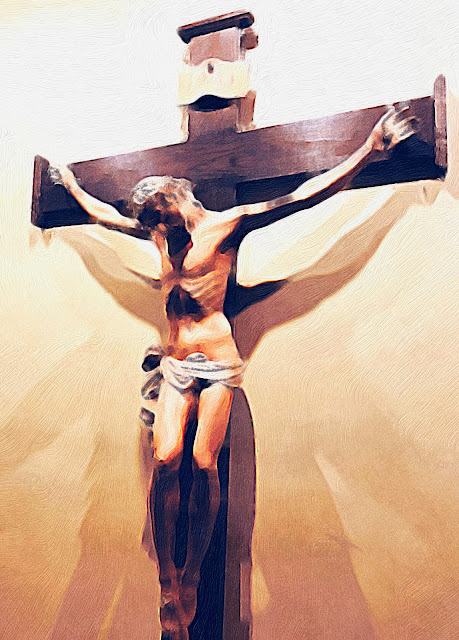“For the sake of his sorrowful Passion, have mercy on us and on the whole world”.
For the past nine days, those words have been said millions of times, as Catholics throughout the world have prayed the Divine Mercy Novena in preparation for today, Divine Mercy Sunday. Beginning on Good Friday and concluding today, the Chaplet of Divine Mercy has been recited as a way of prayerfully reflecting upon the mysteries of our salvation. The Divine Mercy Chaplet is a private devotion – it’s not an official prayer of the Church. But it does encapsulate well what these Easter days invite us to do: to reflect upon what Jesus experienced – his Passion, Death, and Resurrection – and then in light of that invoke God’s blessing upon ourselves.
We tend to think of God’s mercy in relation to our sins. For example, at the beginning of each Mass, we call to mind the times we have failed to love God and one another, and we invoke God’s mercy collectively in the form of asking for his forgiveness (and in turn, the forgiveness of one another). It’s true that forgiveness is the principal aspect of mercy, but mercy goes deeper than that, especially when we are talking about the Divine Mercy. The mercy of God isn’t just about pardoning our offenses; it also heals us, and elevates us, and gives us the strength of grace in the places we need it most. We might say that mercy, all-encompassing, is God’s way of meeting our needs in the present moment and drawing us ever closer to himself as our final end.
It is important to recognize that God’s mercy always comes to us through Jesus. We are able to make supplication to God and invoke his mercies because of the Passion, Death, and Resurrection of his Son. Through those saving mysteries of our faith, the Risen Jesus becomes the instrument of mercy for us – his humanity, once dead but now resurrected, bridges the gap between God’s divinity and our humanity. In other words, it’s through the Risen Body of Jesus that we are saved.
Today’s Gospel gives us a beautiful depiction of exactly this. It’s the Risen Jesus who comes to the disciples, on the evening of Easter Sunday, not with vengeance or recrimination, but instead to bring them mercy. That mercy surely included forgiveness for the fact that they had abandoned him in his hour of need. But it also is given as something much deeper, as peace – “Peace be with you,” Jesus says to them. In the form of peace, the Divine Mercy of Jesus heals them, and restores the friendship they had with him, and finally raises that relationship to a whole new level, as Jesus calls them to become ministers of his mercy to others. And of course in the part of the Gospel that deals with Thomas, we see how it’s his encounter with the Risen Body of Christ that moves him from doubt to belief. For Thomas, the Lord’s Divine Mercy is something tangible, something living, not just given by but encountered through the Risen Body of Jesus.
 |
| Christ and the Doubting Thomas (c. 1480) by Luca Signorelli |
All of this is relevant to us because, in every Mass, we encounter the same Risen Jesus that the disciples did in that upper room. Having called upon God’s mercy, as I mentioned earlier, we are then present, mystically, at the Lord’s Passion and Death in the Eucharistic sacrifice. And having received the Lord’s peace, and having exchanged a sign of that peace to each other, we then encounter the Risen Body of Jesus who communicates God’s mercy and peace to us. In the Eucharist, the Lord makes his own Presence the very font of Divine Mercy that heals us, restores us, and raises our friendship with him to new heights.
Friends, perhaps that prayer of the Divine Mercy Chaplet can become the prayer of each of us today: “For the sake of his sorrowful Passion, have mercy on us and on the whole world.” Because God desires to give us his mercy by giving us an encounter with his Risen Son, who can heal and restore us in all the ways that we need it. Whether it is in the form of Holy Communion, or whether in some way, we need the grace of the Lord’s Divine Mercy to move us in the way that it moved Thomas and the other disciples, from fear to faith, from doubt to belief. Though we may not see the Lord’s Risen Body in the same way as the disciples did, we can encounter him here just as truly, just as intimately – and blessed are we if we believe that.
Friends, perhaps that prayer of the Divine Mercy Chaplet can become the prayer of each of us today: “For the sake of his sorrowful Passion, have mercy on us and on the whole world.” Because God desires to give us his mercy by giving us an encounter with his Risen Son, who can heal and restore us in all the ways that we need it. Whether it is in the form of Holy Communion, or whether in some way, we need the grace of the Lord’s Divine Mercy to move us in the way that it moved Thomas and the other disciples, from fear to faith, from doubt to belief. Though we may not see the Lord’s Risen Body in the same way as the disciples did, we can encounter him here just as truly, just as intimately – and blessed are we if we believe that.
.jpg)

